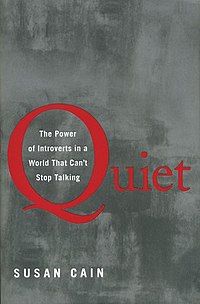What it has going for it:
The book goes over the science of introverted and extroverted personality types. The author is not a scientist herself, but has done quite a bit of research into the science and spoken to scientists, psychologists, and other experts on the subject. Having these examples, studies, and case studies included is really helpful for people who have never really understood why they are more introverted or extroverted.It goes a long way to making a case for a new approach for rearranging education and workplace environments, as well as how we interact and communicate with our peers, partners, family members, coworkers, and others around us.
It includes backgrounds and case studies on specific individuals in places like Harvard Business School and Silicon Valley, and explains how some introverts overcome some aspects of their personality in order to lead a cause, do a job, or participate in their relationships.
Unsurprisingly, the book is sympathetic to introverts, but it is not entirely condemning of extroverts. Rather, it condemns the "extrovert ideal" and supports a more balanced or mixed standard. This standard will focus more on allowing each type of individual to demonstrate their strengths rather than expecting or even requiring individuals to show a particular set of skills or personality traits, and condemning them when they don't. It applies to teaching, parenting, hiring, working together, living together, and any aspect of our daily lives and interactions.
 |
| Author Susan Cain |
Where it is lacking:
Not enough case studies. The book is nothing but psychological experiments and case studies, but I still felt like it didn't go as deep as it could have or offer as many examples as it could have for some of the topics, especially during the second half of the book.I think the book would have benefited from talking about more successful, well-known introverts. It discussed a few, like Rosa Parks, Gandhi, Steve Wozniak, Eleanor Roosevelt, and Warren Buffett, but it could have included more examples, specifically more modern examples that include discussion with the person directly rather than taking details from biographies.
Why it's worth the read:
If you're an introvert, you can learn more about why your brain works the way it does, why you prefer certain activities and habits over others, and a little bit about how, why, and when you should go out of your introverted comfort zone. |
| John Lennon Peace Monument, Liverpool, UK |
Overall, this is a great book for everyone to gain a better understanding of both personality types and how to get the most out of your interactions with each no matter what you're working on--a class project, a client report, a marriage or anything else.
Give peace [and quiet] a chance.
-John Lennon
-John Lennon


No comments:
Post a Comment